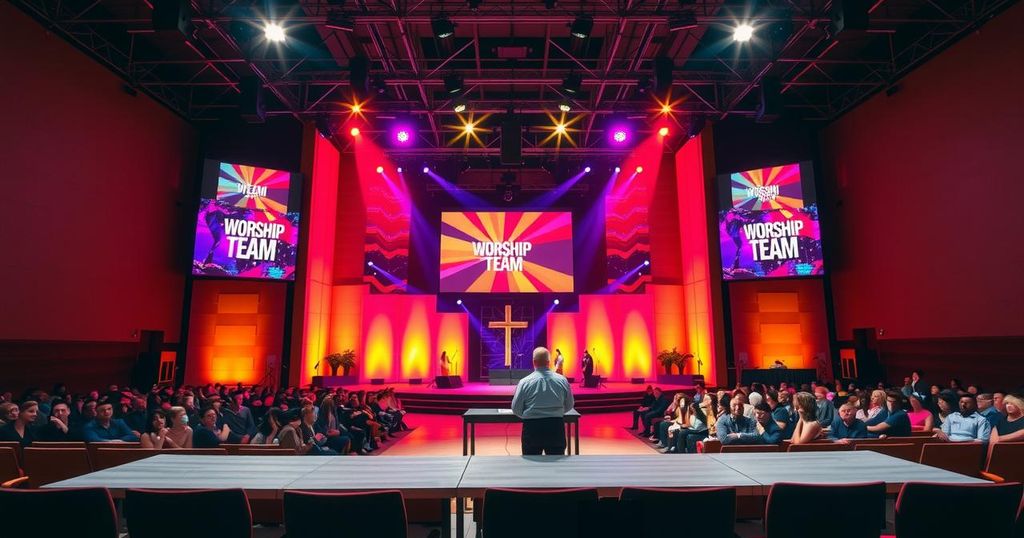Why Some Evangelicals Remain Committed to Supporting Trump
In the tangled web of American politics, few things are as fascinating as the enduring support Donald Trump garners among Evangelicals. Pastor Chad Harvey from Cross Assembly Church in Raleigh, North Carolina, provides insight into why these believers stick by Trump, despite the controversies surrounding him. On a recent evening, Harvey shared that political talk isn’t the primary focus of his congregation; rather, their aim is to navigate life’s challenges while affirming their faith. With local elections approaching, the convergence of politics and spirituality takes centre stage, revealing layers of misunderstanding that exist beyond the church walls.
Evaluating the Intersection of Faith and Politics
Why Evangelicals Stick With Trump In the polarizing landscape of modern politics, the support shown by many Evangelicals for former President Donald Trump stands out. It raises eyebrows and questions too — how exactly do these staunch believers reconcile their faith with a figure often embroiled in controversy? For pastor Chad Harvey at Cross Assembly Church in Raleigh, North Carolina, this support isn’t just a political statement; it’s intertwined with a broader spiritual perspective. He insists that the Biblical teachings guide his congregation more than the personal failings of any political leader truly could.
Inside the Heart of the Church
A Unique Environment at Cross Assembly As the scene unfolds at Cross Assembly Church, it’s hard to miss the palpable energy radiating from the worship team audition night. This isn’t just about church; it feels like American Idol meets a spiritual revival. Pastor Chad Harvey leads his congregation in sermons that attract around 3,000 folks every week, sharing messages that echo on social media. However, he maintains that, while politics does occasionally bubble up in discussion, it only occupies a tiny fraction of life here. Harvey emphasizes the mundane realities his congregation navigates daily; they’re focused on life, family, work — not constantly on political debates. It’s a startling revelation for those from the outside looking in.
Understanding Political Choices
The Politics of Support So, what drives these believers to support certain candidates? Pastor Harvey suggests it’s less about personalities and more about platforms. He articulates this idea to his congregation, urging them to focus on policies while acknowledging that every politician has flaws. In his eyes, supporting Trump isn’t about ignoring his missteps, it’s about aligning with a platform that mirrors their beliefs. He often refers to scriptural teachings that underscore human imperfection. Trump might have his problems, but many Evangelicals see his stance on key issues as more closely aligned with their values than those of opposing candidates.
Ensuring Fair Accountability
Accountability and Consequences However, Detrow presses on, questioning whether this acceptance creates a lack of accountability. Harvey admits that at some point there definitely is a line to be crossed. While he encourages scrutiny of all candidates, he believes that the same standards should apply universally across the board. It’s about being fair and consistent in judgement. The dialogue flows back and forth like a dance, exposing the nuanced beliefs that underpin Harvey’s teachings. Even with a candidate like North Carolina’s Lieutenant Governor, Mark Robinson, who resonates with the church’s message and values, he reiterates that public figures must still be held to account, albeit thoughtfully.
Clarifying Evangelical Motivations
Misconceptions about Evangelical Beliefs Finally, looking outward, Harvey reflects on what he feels are widespread misconceptions about Evangelical believers. Particularly the notion of ‘Christian nationalism’ has gained traction as a cliché in political discourse, but he argues that many in his circle simply desire to lead a quiet life while spreading their faith, not imposing it. From his perspective, many congregants want to enjoy their lives and live peaceably, sharing the good news of Jesus without the need to dominate political conversations. The truth, as he sees it, is that many Evangelicals aren’t as fixated on politics as they might be perceived, nor are they trying to craft a theocratic society.
Why do many Evangelicals continue to support Trump despite his controversies?
Many Evangelicals support Trump for various reasons, primarily for his political platform which aligns closely with their values on issues such as family, religious freedom, and social conservatism.
How much do politics really play into the life of Evangelical congregations?
Pastor Chad Harvey suggests that political discussions take a backseat to daily life for most congregants. In his view, only about 1-2% of conversations revolve around politics within the community.
How do Evangelicals choose which candidates to support?
Harvey recommends focusing on the policies candidates support rather than their personal lives. He believes that their political platform is what matters most to his congregation.
Is there a point at which Evangelicals would stop supporting a politician?
In Harvey’s experience, there’s a concern that decent moral standards must be applied consistently across all political figures. He believes that there hasn’t yet been a significant moral line crossed that would change his congregation’s support.
What do Evangelicals really want in terms of their political influence?
Many Evangelicals, according to Harvey, just want to live peacefully and share their faith without the pressure to make America a ‘Christian nation’. He highlights that misconceptions about their motives are rampant.




